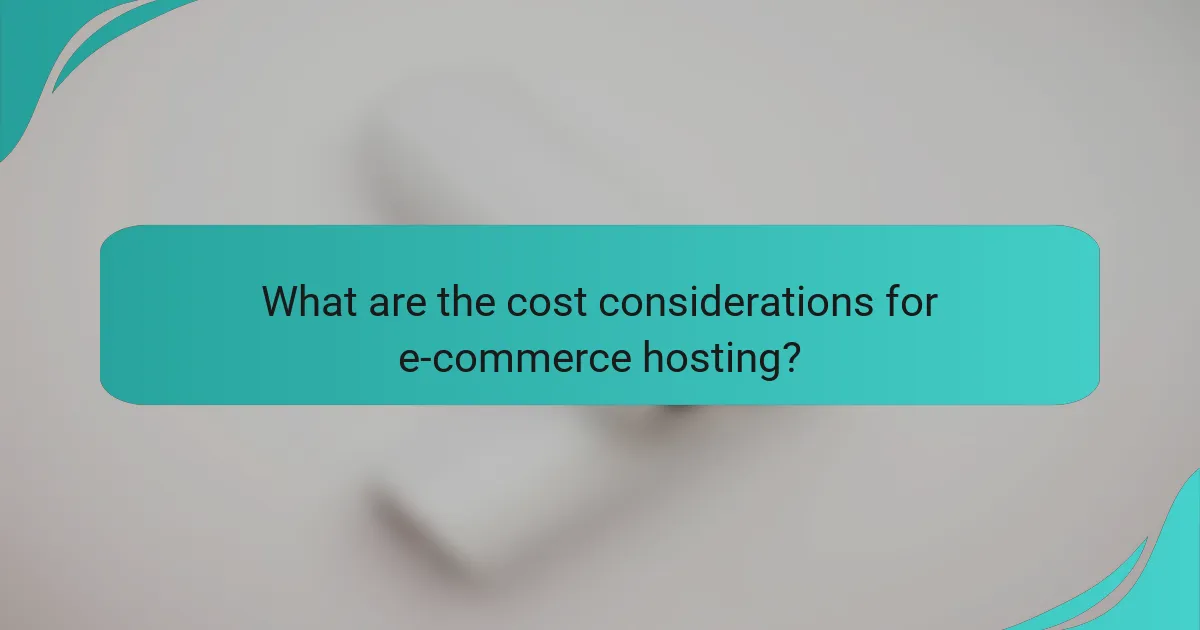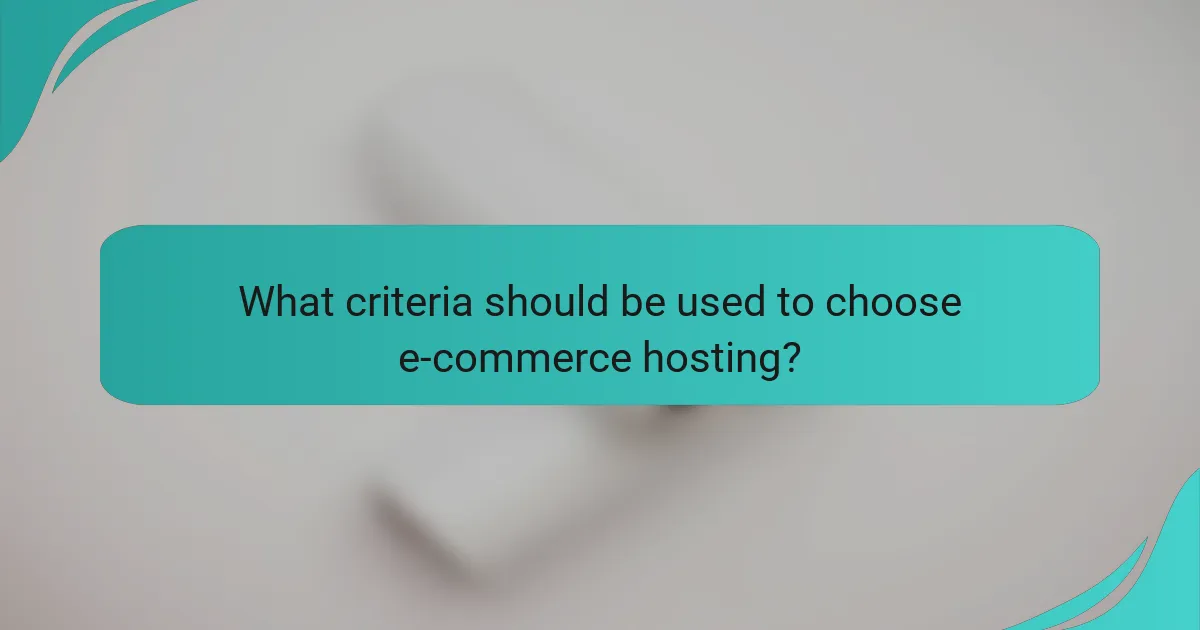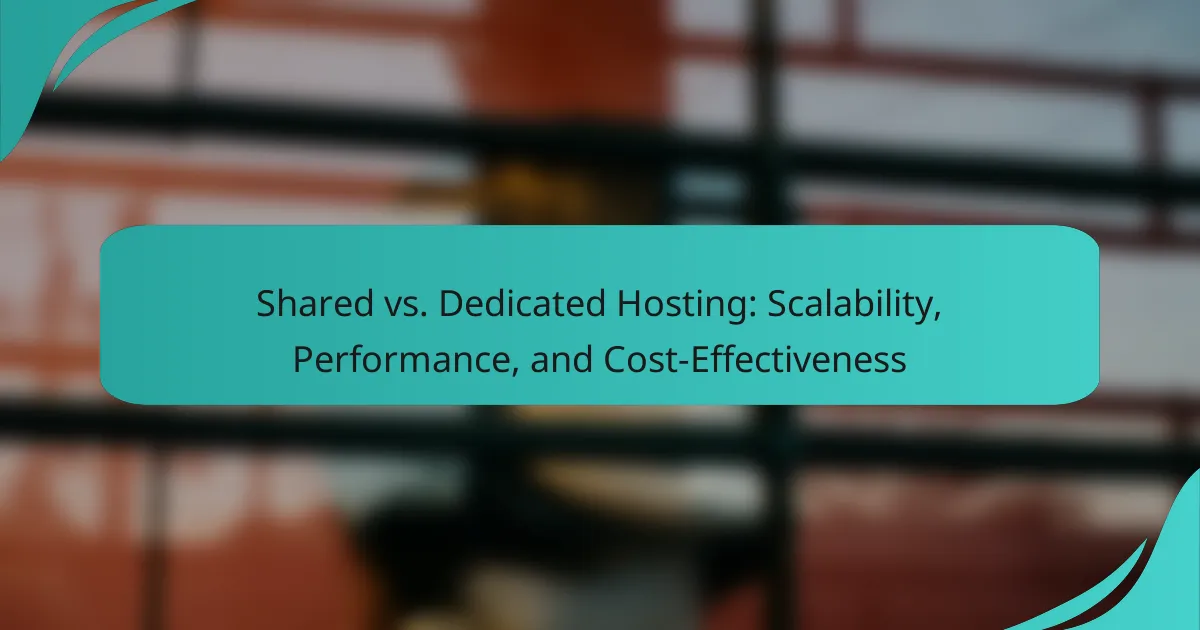Choosing the right e-commerce hosting solution is essential for online retailers, as it impacts scalability, performance, and overall cost. A robust hosting platform allows businesses to adapt to fluctuating traffic demands while maintaining optimal site performance. By prioritizing features like fast page load speeds and reliable uptime, retailers can enhance customer satisfaction and drive conversions effectively.

What are the best e-commerce hosting solutions in Canada?
The best e-commerce hosting solutions in Canada offer a combination of scalability, performance, and cost-effectiveness. These platforms cater to various business sizes and needs, ensuring that online retailers can efficiently manage their operations while providing a seamless shopping experience for customers.
Shopify
Shopify is a leading e-commerce hosting solution known for its user-friendly interface and robust features. It provides a fully hosted platform, allowing businesses to set up an online store quickly without worrying about server management.
With a range of pricing plans, Shopify supports scalability, making it suitable for small startups to large enterprises. Its built-in payment processing and extensive app marketplace enhance functionality, but transaction fees may apply depending on the plan chosen.
BigCommerce
BigCommerce is another strong contender in the e-commerce hosting space, offering a powerful platform that supports high-volume sales. It features a range of built-in tools for SEO, analytics, and marketing, which can help businesses grow their online presence.
This solution is particularly beneficial for businesses looking to scale, as it can handle large product catalogs and high traffic without compromising performance. However, users should be aware of the learning curve associated with its more complex features.
WooCommerce on Bluehost
WooCommerce, when paired with Bluehost, provides a flexible e-commerce solution ideal for WordPress users. This combination allows for extensive customization and control over the online store, appealing to those with specific design or functionality needs.
Bluehost offers optimized hosting plans for WooCommerce, ensuring fast loading times and reliable uptime. While this setup can be cost-effective, users should consider the additional time required for setup and maintenance compared to fully hosted solutions.
SiteGround
SiteGround is known for its exceptional customer support and performance, making it a solid choice for e-commerce hosting. It offers managed WordPress hosting that integrates seamlessly with WooCommerce, providing a reliable environment for online stores.
With features like automatic updates and daily backups, SiteGround ensures that your store remains secure and up-to-date. However, its pricing can be on the higher side, especially when renewing after the initial term.
HostGator
HostGator is a budget-friendly e-commerce hosting option that provides a range of plans suitable for various business sizes. It offers one-click installations for popular e-commerce platforms like WooCommerce, making it easy to get started.
While HostGator is cost-effective, users should be cautious about potential limitations in performance and scalability as their business grows. It’s advisable to monitor site speed and uptime closely to ensure a positive shopping experience for customers.

How does scalability impact e-commerce hosting?
Scalability is crucial for e-commerce hosting as it determines how well a platform can handle varying traffic loads and resource demands. Effective scalability ensures that an online store can grow without compromising performance or incurring excessive costs.
Elastic scalability
Elastic scalability allows e-commerce platforms to automatically adjust resources based on current demand. This means that during peak shopping times, such as holidays or sales events, the system can expand to accommodate increased traffic and then scale back down during quieter periods.
For instance, a store might experience a surge in visitors during Black Friday, requiring additional server capacity. Elastic scalability ensures that these resources are available without the need for manual intervention, optimizing both performance and cost efficiency.
Load balancing
Load balancing distributes incoming traffic across multiple servers, preventing any single server from becoming overwhelmed. This is essential for maintaining fast response times and reliable service, especially during high-traffic events.
Using load balancing, an e-commerce site can ensure that no single server handles too many requests, which could lead to slowdowns or crashes. Implementing a load balancer can improve user experience and increase overall site reliability.
Auto-scaling features
Auto-scaling features automatically adjust the number of active servers based on real-time traffic patterns. This means that if a sudden spike in visitors occurs, additional servers can be activated to handle the load without manual input.
For example, if an e-commerce site typically runs on a few servers but suddenly sees a traffic increase, auto-scaling can add more servers in minutes. This flexibility helps manage costs effectively, as businesses only pay for the resources they use during peak times.

What performance features should e-commerce hosting have?
E-commerce hosting should prioritize performance features that enhance user experience and site reliability. Key aspects include a Content Delivery Network (CDN), uptime guarantees, and fast page load speeds, all of which contribute to higher customer satisfaction and improved conversion rates.
Content Delivery Network (CDN)
A Content Delivery Network (CDN) is a system of distributed servers that deliver web content to users based on their geographic location. By caching content closer to users, CDNs reduce latency and improve load times, which is crucial for e-commerce sites where every second counts.
When selecting a CDN, consider factors like coverage, speed, and integration with your hosting provider. Popular options include Cloudflare and Akamai, which offer various pricing tiers to suit different business needs.
Uptime guarantees
Uptime guarantees indicate the reliability of your e-commerce hosting service. Most reputable providers offer uptime assurances of 99.9% or higher, meaning your site should be accessible almost all the time.
When evaluating uptime guarantees, check the provider’s track record and any compensation policies for downtime. A reliable host minimizes disruptions, which is essential for maintaining sales and customer trust.
Page load speed
Page load speed is a critical performance feature that directly impacts user experience and search engine rankings. Ideally, your e-commerce site should load in under three seconds to prevent potential customers from leaving.
To optimize page load speed, consider using image compression, minimizing HTTP requests, and leveraging browser caching. Regularly test your site’s speed using tools like Google PageSpeed Insights to identify areas for improvement.

What are the cost considerations for e-commerce hosting?
Cost considerations for e-commerce hosting include various fees that can significantly impact your overall budget. Understanding these costs helps in selecting a hosting provider that aligns with your business needs and financial constraints.
Monthly subscription fees
Monthly subscription fees are the primary cost associated with e-commerce hosting. These fees can vary widely based on the hosting plan, ranging from around $10 to several hundred dollars per month, depending on features and resources. It’s essential to compare plans to find one that offers the best value for your specific requirements.
When evaluating subscription fees, consider factors such as bandwidth, storage, and customer support. Some providers may offer lower monthly rates but charge more for essential features, so look for a plan that balances cost with the necessary capabilities.
Transaction fees
Transaction fees are additional costs that can arise from processing payments through your e-commerce platform. These fees typically range from 1% to 3% per transaction, depending on the payment processor you choose. Some hosting providers may include payment processing in their services, while others may charge separately.
Be mindful of how transaction fees can accumulate, especially for businesses with high sales volumes. Choosing a hosting provider that offers competitive transaction rates can save you significant money in the long run.
Hidden costs
Hidden costs in e-commerce hosting can include expenses such as domain registration, SSL certificates, and premium support services. These costs can add up quickly, so it’s crucial to read the fine print of any hosting agreement. Some providers may advertise low monthly fees but charge extra for essential features that are not included in the base price.
To avoid surprises, create a checklist of all potential costs associated with your hosting plan. This should include renewal fees, add-ons, and any potential penalties for exceeding resource limits. Understanding these hidden costs will help you make a more informed decision and budget accordingly.

What criteria should be used to choose e-commerce hosting?
When selecting e-commerce hosting, prioritize performance, scalability, and customer support. These criteria directly impact your online store’s efficiency, growth potential, and reliability in addressing issues.
Performance benchmarks
Performance benchmarks are essential for evaluating how well an e-commerce hosting service can handle traffic and transactions. Look for metrics such as page load times, uptime percentages, and response times. Aim for load times under two seconds and uptime rates above 99.9% to ensure a smooth shopping experience.
Consider testing hosting providers using tools like GTmetrix or Pingdom to get real-time performance data. This can help you compare different services and identify the best fit for your needs.
Scalability options
Scalability options determine how well your hosting can grow with your business. Choose a provider that offers flexible plans, allowing you to upgrade resources like bandwidth and storage as your traffic increases. Look for services that support cloud hosting or dedicated servers for easier scaling.
Evaluate whether the hosting provider can accommodate sudden traffic spikes, such as during sales events or holiday seasons. A good host should provide features like auto-scaling to manage increased demand without downtime.
Customer support quality
Customer support quality is crucial for resolving issues quickly and effectively. Opt for hosting providers that offer 24/7 support through multiple channels, including live chat, phone, and email. Fast response times and knowledgeable staff can significantly reduce downtime and enhance your overall experience.
Check reviews and testimonials to gauge the reliability of customer support. A provider with a strong reputation for assistance can save you time and frustration, especially during critical business hours.










